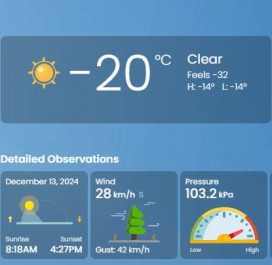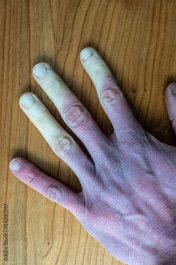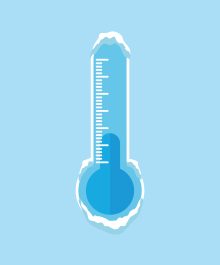Staying safe and warm in extreme cold
Plan ahead, be prepared and protect your health in extreme cold weather this winter.
Local government | December 18, 2024
Winter weather in Canada is unpredictable and can bring with it extreme cold temperatures at short notice. Preparation is the best way to ensure your safety and well-being during the winter months.
Paying attention to incoming cold weather

Paying attention to incoming weather can be the best way to avoid situations that may impact your health and well-being. In Canada, there are many reliable sources where you can monitor weather reports that you can bookmark and make a part of your daily routine. Remember to not only check for the temperature but also look at the wind chill.
Check the weather on the Weather Network or the WeatherCAN app from Environment Canada for details on weather conditions. Being aware of changing conditions can help you prepare accordingly and help you avoid getting caught off guard.
Dress for cold weather

Exposure to the cold can be hazardous and sometimes life-threatening. If you’re heading out into cold weather, dressing appropriately and preparing for your outing can ensure you avoid health issues such as frostbite, hypothermia and cold exposure. Make sure to wear layers so you can go about your day outdoors without your body being impacted by extreme cold or even overheating. Here are some tips to help you stay safe and healthy in the cold:
- Dress in layers: Layers allow you to cover up when it gets colder or remove layers if you overheat. Always make sure your outside layer is wind and water resistant.
- Cover up exposed skin: Frostbite can occur in minutes during extreme cold, especially with a wind chill present. Protect sensitive spots like your face, ears, fingers and toes with proper winter gear like insulated gloves, a scarf, boots and a toque. Cover your mouth to protect your lungs from the cold air. In temperatures of -15°C or colder, unprotected skin can freeze in less than 30 minutes and the risk of developing hypothermia is high. Your body’s extremities, such as the ears, nose, fingers and toes, lose heat the fastest.
- Staying dry helps you stay warmer: If you’re doing outdoor activities like hiking or skiing, you can sweat, which can lower your body temperature. A break to change underlayers to stay dry will help you avoid the risk of hypothermia or a drop of your body temperature to unsafe levels. It is easy to lose track of your body temperature dropping in the cold, so always take time to head inside where you can change your winter clothes and assess how you’re feeling.
- Check in on children and older adults: Make sure young children and older adults in your care are properly dressed and prepared for the outdoors during extreme cold events. Lending a helping hand to little ones and our more elderly population can make all the difference to a healthy and safe cold season.
- Wear appropriate winter footwear: Wear insulated, waterproof boots to keep your feet warm and dry. Slip-resistant soles or additional traction devices can help prevent falls on icy pathways, a common hazard during winter. Properly insulated footwear is essential to protecting your feet from cold-related injuries like frostbite.
Exercising outdoors
- Although keeping active can help generate body heat, pace your outdoor activity as vigorous exercise and cold temperatures can cause high blood pressure and accelerated heart rates.
- If shovelling, be sure to warm up your muscles before you start and break frequently.
Extreme cold weather safety tips
Take the following steps to reduce your risk in extremely cold weather:
- Use caution on slippery surfaces. Falls on ice-covered sidewalks, steps, and driveways can lead to injuries. Keep these areas clear of snow and apply salt or sand on ice.
- Avoid overexertion, such as heavy shovelling, which can strain your heart.
- It may go without saying in today’s day and age but having a fully charged cell phone with you could make the difference between life and death if you’re caught outside in an extreme cold weather situation. Charge up your phone and make sure you have it on you before heading out the door.
Cold weather and health risks
Prolonged exposure to cold weather can lead to health risks – some with the potential to be serious. Frostbite, hypothermia and even heart attack can be brought on due to prolonged exposure to extreme cold weather. Learn how to identify these conditions and symptoms to help you avoid them.
Frostbite

Frostbite can lead to nerve damage, blistering, and at its worst and most extreme, amputation. Ensure exposed skin is covered and avoid prolonged exposure to the cold whenever possible.
- Skin can be numb, appear yellowish or white and is hard to the touch.
- Your skin and underlying tissue can freeze.
Hypothermia
Severe hypothermia can be life-threatening. If you or anyone with you complains of any of these symptoms, seek immediate medical assistance.
- Exposure to cold over a prolonged period can cause a drop in body temperature, which can be life-threatening.
- Watch for shivering, confusion and loss of muscular control or difficulty walking.
Heart attack

- Extreme cold reduces circulation and can put more strain on the heart.
- If you suffer from cardiovascular challenges, talk to your doctor about cold exposure before the winter months.
- Watch for chest pain, shortness of breath or weakness and call 911 if necessary.
If you’re prone to cardiovascular issues, be alert for symptoms of heart attack and seek medical attention immediately.
Living in Canada means being able to enjoy every season. However, respecting the weather, and it’s increasing unpredictability, can make all the seasons more enjoyable and keep you and those around you safe and healthy. This winter be prepared and stay safe.
For more information about winter safety and preparing for extreme winter storms, visit the additional resources below:
Cold Weather Safety – Resources
Environment Canada – Wind chill and cold weather page
Canadian Red Cross – Staying warm and safe in Canadian winters
Tags
Media contact
City of Mississauga Media Relations
media@mississauga.ca
905-615-3200, ext. 5232
TTY: 905-896-5151
